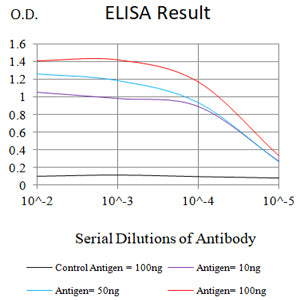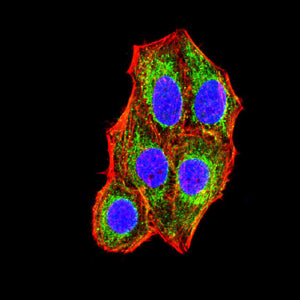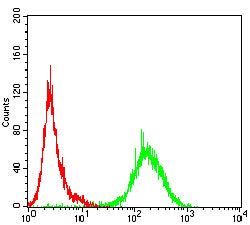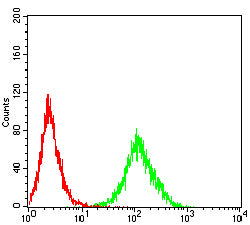



| WB | 咨询技术 | Human,Mouse,Rat |
| IF | 咨询技术 | Human,Mouse,Rat |
| IHC | 咨询技术 | Human,Mouse,Rat |
| ICC | 1/200 - 1/1000 | Human,Mouse,Rat |
| FCM | 1/200 - 1/400 | Human,Mouse,Rat |
| Elisa | 1/10000 | Human,Mouse,Rat |
| Aliases | V28; CCRL1; GPR13; CMKDR1; GPRV28; CMKBRL1 |
| Entrez GeneID | 1524 |
| clone | 2H4C9 |
| WB Predicted band size | 40.4kDa |
| Host/Isotype | Mouse IgG2a |
| Antibody Type | Primary antibody |
| Storage | Store at 4°C short term. Aliquot and store at -20°C long term. Avoid freeze/thaw cycles. |
| Species Reactivity | Human |
| Immunogen | Purified recombinant fragment of human CX3CR1 (AA: extra mix) expressed in E. Coli. |
| Formulation | Purified antibody in PBS with 0.05% sodium azide |
+ +
以下是关于CX3CR1抗体的3篇参考文献及其摘要内容:
1. **文献名称**:*CX3CR1 protein signaling modulates microglial activation and protects against plaque-independent cognitive deficits in a mouse model of Alzheimer’s disease*
**作者**:Cho SH等
**摘要**:该研究利用CX3CR1抗体标记小鼠脑组织中的小胶质细胞,发现CX3CR1信号通路通过调节β-淀粉样蛋白沉积和神经炎症,对阿尔茨海默病模型小鼠的认知功能具有保护作用。
2. **文献名称**:*Ly6C-high monocytes dominate hypercholesterolemia-associated monocytosis in mice and modulate CX3CR1-dependent migration*
**作者**:Tacke F等
**摘要**:通过CX3CR1抗体进行流式细胞分析,研究发现高胆固醇血症小鼠中Ly6C高表达单核细胞亚群增加,其迁移能力依赖于CX3CR1信号,提示该受体在动脉粥样硬化中的调控作用。
3. **文献名称**:*CX3CR1 deficiency alters microglial activation and reduces beta-amyloid deposition in a mouse model of Alzheimer’s disease*
**作者**:Lee S等
**摘要**:利用CX3CR1基因敲除小鼠及特异性抗体,证实CX3CR1缺失可改变小胶质细胞活化状态,减少β-淀粉样蛋白沉积,为神经退行性疾病的免疫治疗提供新方向。
CX3CR1 is a chemokine receptor belonging to the G protein-coupled receptor (GPCR) family, primarily expressed on immune cells such as monocytes, microglia, dendritic cells, and natural killer cells. It binds to its sole ligand, CX3CL1 (fractalkine), a membrane-anchored or soluble chemokine involved in leukocyte migration, adhesion, and immune surveillance. CX3CR1 plays critical roles in neuroinflammation, atherosclerosis, cancer metastasis, and tissue homeostasis, making it a target for studying immune cell behavior in health and disease.
CX3CR1 antibodies are essential tools for detecting receptor expression, tracking cell populations, and investigating signaling pathways. These antibodies are widely used in flow cytometry, immunohistochemistry (IHC), and Western blotting to identify CX3CR1⁺ cells in tissues like the brain, liver, or tumor microenvironments. Specific clones (e.g., 2A9-1. 4L10-G2) recognize epitopes in the extracellular domain, enabling functional studies such as receptor blocking or ligand-binding inhibition. In research, CX3CR1 antibodies help elucidate the receptor’s role in neurodegenerative diseases (e.g., Alzheimer’s, multiple sclerosis) by profiling microglial activation, or in cancer by assessing macrophage polarization. They also aid in validating genetic models, such as CX3CR1-deficient mice, to study disease mechanisms. Due to CX3CR1’s dual roles in immune regulation and pathology, its antibodies are vital for both basic research and therapeutic development, bridging immune function with clinical applications.
×